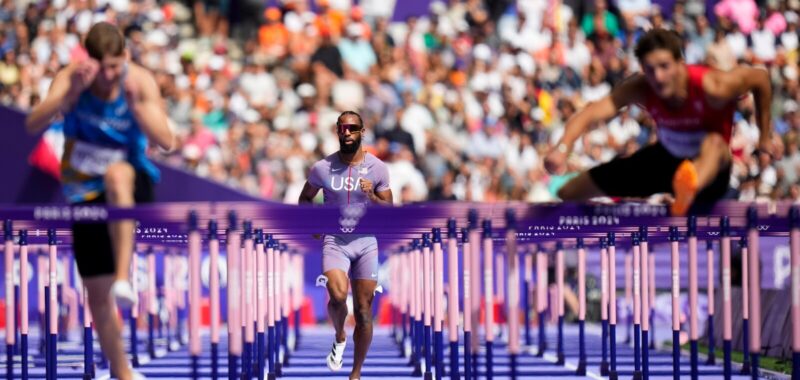SAINT-DENIS, France — Taking the easy road has never been the way for American hurdler Freddie Crittenden, and he certainly didn’t change at the Olympics.
Crittenden advanced to the final of the 110-meter hurdles Wednesday, three days after he intentionally exploited a new “repechage” rule in track that gives runners and hurdlers a second chance if they don’t advance through the first round.
Nursing an adductor injury heading into Paris, he jogged through the 10 hurdles in his opening round, essentially giving himself an extra day to nurse the injury.
It worked. He’s feeling better — he’s wearing plenty of tape on his right leg — and ready to race even if he’s a little tired.
“This unfolded beautifully,” said Crittenden, who finished second in his semifinal heat to advance after winning his repechage heat Tuesday. “This isn’t really a new thing for me. My coach and I always, always, always, always say, ‘If we’re not feeling it, let’s Plan B it. Take it easy, figure it out, live to fight another day.'”
That was the plan in Paris. That’s been the plan in his career, too.
Unsponsored by a shoe company until just a few weeks ago — he said Adidas signed him — the 30-year-old Crittenden has worked at a video-game retailer, warehouse and as a substitute teacher to make ends meet while training.
“You have competitors that have all the resources in the world, you have to do everything you can to get to this point,” Crittenden said. “You have to keep your head down, be optimistic, be patient, and hope that all this stuff will be worth it.”
Nicknamed “Fast Freddie” in high school by family members, Crittenden was primed for a big year in 2021 when injuries began to hit right before the Olympic trials. He didn’t make the Tokyo Games.
Before he left trials three years ago in Eugene, Oregon, Crittenden bent down and gave the track a farewell kiss. He figured that was it for his career.
To capture the moment, he had a picture taken.
Turns out, he wasn’t done.
Not after his wife and training partners persuaded him to keep going. Crittenden returned for the 2022 with renewed confidence. He recorded a personal-best time that season and broke it at the Olympic trials in late June to make the U.S. squad. He’s among the favorites in the event along with teammates Daniel Roberts and Grant Holloway, the three-time world champion and Olympic silver medalist from Tokyo. Holloway ran 12.98 seconds to post the top time in the semifinals.
“I’ve been getting my butt kicked by Grant Holloway since 2016,” Crittenden cracked.
Roberts doesn’t see Crittenden’s extra trip down the track slowing down him — or the chances of an American sweep on Thursday.
“Freddie’s going to be ready,” Roberts said. “Freddie has been through so much in his career, so many ups and downs. … I’m excited for him.”
Crittenden used the repechage round to his advantage. He needed the safety net to get his leg back to as close to 100% as possible. The rule is designed for hurdlers and sprinters between the distances of 200 and 1,500 meters. It gave him just that little extra time to heal.
“I foresaw that this would put me in the best position to perform at a high level in the final,” Crittenden said. “That’s why I took the risk.”
He said the rule does need some fine-tuning. For instance, the men’s 400 meters had their first-round heat Sunday night and the repechage round Monday morning.
“I think they need to make some tweaks so a lot of athletes can benefit from it the way I have,” Crittenden said. “It can be a good thing, but it has to equitable for everybody.”
___
AP Olympics: https://apnews.com/hub/2024-paris-olympic-games

